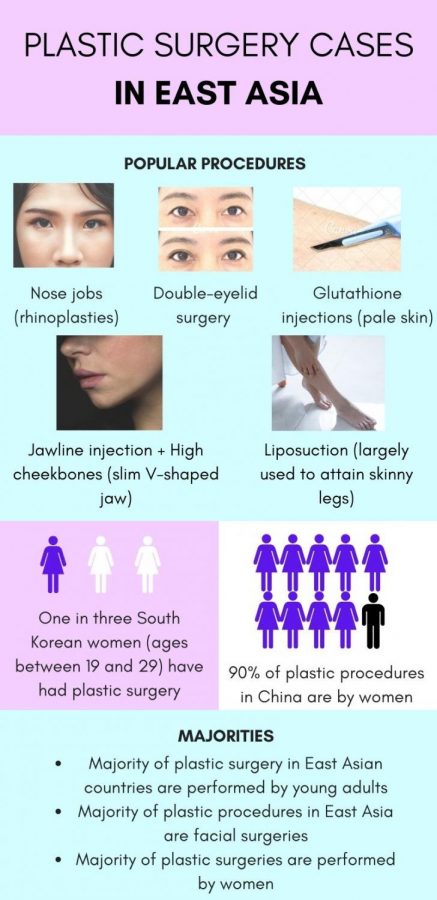Toxic beauty standards: Why East Asian countries should not idealize Western features
Plastic surgery cases in East Asia continue to rise in large numbers. Sources: Business Insider news website, Psychology Today magazine, CNN
November 20, 2020
Pale skin. A thin nose. Double-eyelids.
Those who have these features are likely on the right track to attaining the “ideal” look that many East Asian countries praise. Unfortunately, in many of these countries, the concept of beauty is homogeneous. Hence, when walking through the streets of Seoul, Beijing or Tokyo, it won’t come as a shock if the majority of the crowd has similar makeup and features.
The idolization of pale skin, one of the many East Asian beauty standards, has been around for centuries and is one of the adverse vestiges of past historical prejudices.
“Most of it has its roots in history—more specifically, colonialism, which resulted in the promulgation of European beauty standards in cultures all over the world,” junior and Asian Student Association co-leader Jessica Yang said. “Even before European colonialism, fair skin was considered desirable in many civilizations, because it meant you were wealthy enough to stay inside and not work. This desire for fair skin has carried into the modern day, even though fair skin isn’t necessarily an indicator of wealth anymore.”
Although much of the stigma surrounding darker skin was much more prominent in history, the view of fair skin as “desirable” has since remained an integral part of East Asian beauty standards. Many East Asian makeup products are even specifically geared toward lightening the skin. Whether people wear a foundation shade much lighter than their skin type or use skin bleaching products, there are tools available to help them attain a lighter shade. It is completely immoral to deem light skin as “superior,” because as a result, darker skin is directly labeled as inferior, which reinforces historical racial inferiority complexes that countries should completely condemn.
“Darker skinned people get treated worse than lighter skinned people,” senior Aaron Lin said. “It’s a sign of Western supremacy in our world and the lingering effects of imperialism.”
If the list of Asian beauty standards ended with pale skin, then it would be easy to attribute the cause of this societal norm to historical circumstances. However, the East Asian beauty list goes on to include features such as thin noses and double-eyelids—both of which are not traditionally East Asian features.
“Seeing tall, light-skinned people with skinny noses, big eyes and straight hair in movies, television shows and magazines can definitely have a detrimental effect on young girls and boys,” Yang said. “These cultures should be more accepting of traditionally non-European beauty traits. It is unrealistic to hold the people of color in these societies to the beauty standards of Europeans because they aren’t European, and naturally, there won’t be many people who hold up to [those standards].”
As a result of many East Asian countries idealizing Western beauty features, plastic surgery is extremely common in these countries, especially among young adults. South Korea, China and Japan are among the top countries globally in plastic surgery procedures. According to a report from The Business Insider, one in three South Korean women between the ages of 19 and 29 have undergone plastic surgery; however, these operations should not be condoned when the reasoning stems from hatred towards one’s innate cultural features.
According to CNN, more than 50% of the plastic surgery cases in China are performed on those under the age of 26. In East Asia, plastic surgery is encouraged at a young age, as opposed to countries like the U.S. where only about 6% of plastic surgery cases are done by individuals under the age of 30. In South Korea specifically, plastic surgery is sometimes seen as a high school “graduation gift,” in which parents pay for their children to have a procedure; these parents want their child to look “pretty” before they send them off to college and the workforce. As noted by The Atlantic, the competitive culture within these societies often encourage East Asians to undergo plastic surgery, as it is believed that the “better looking” individual has an easier chance at obtaining jobs, finding a spouse and so forth.
However, no Asian individual should ever feel inclined to go under the knife to buy an “ideal” face. At the end of the day, East Asians have their own intrinsic beauty—and they should wear it proudly.
“[East Asians] need to recognize that people of all cultures are born with different physical features unique to their ethnicity,” junior and Asian Student Association co-leader Samantha Chin said.
It will take a long time to completely erase the toxic East Asian beauty standards, but it’s an effort that must be done. Whether it’s through pop idols promoting natural beauty or makeup products being more inclusive of different skin types, little by little, all East Asian countries should discourage idealizing Western features.
“It’s hard because beauty norms are not really regulated,” Lin said. “It’s really just up to icons to stray from conventional beauty standards and remove internal bias.”
If more East Asian celebrities embraced their natural features, then young Asians would begin to see themselves reflected in highly venerated figures, and this could allow for more self-acceptance within East Asian culture.
“The most important step to take to stray away from controversial western physical norms is to include much, much more Asian representation in the media,” Chin said. “These standards come from young children and adults primarily seeing western representation in movies, magazines, runway shows, etc.”
By embracing diversity, Eurocentric beauty standards would no longer be considered “ideal.” Each country would celebrate their own unique ethnic features with open arms, proud to see their culture reflected for what it truly is. The East Asian individual with tan skin, a flat nose and a monolid is just as stunning as any other person—and they should own it.
“Change won’t happen within a day,” Yang said. “But by trying to be just a little more inclusive and open-minded in their search for beauty and talent, [the entertainment industry] can make a huge impact on the way people think and perceive each other.”



